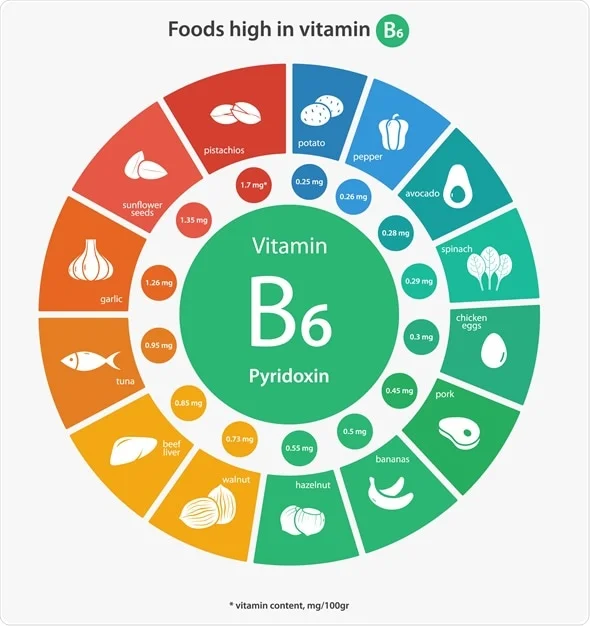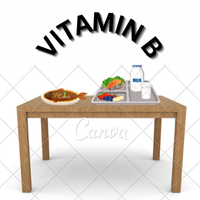Vitamin B is one of eight essential elements that work together to carry out the body’s activities smoothly.
All these together play the most important role in converting food into energy, which is important for your body to stay energetic and function actively throughout the day. It is also important for keeping skin, eyes, and hair healthy, the nervous system and brain in good shape, etc.
Vitamin B12 helps immensely in the formation of red blood cells. While Vitamin B6 helps in maintaining brain health, having adequate amounts of this inside your body keeps your body healthy and energetic.
Otherwise, due to their deficiency, they suffer from laziness and other diseases. Your body cannot store most vitamins, so it is important to include a variety of vitamin-rich foods in our diet.
As sago, grains, meat, eggs, dairy products, green vegetables, etc. all of them contain sufficient vitamins. Which provides benefits to our body. And keep us safe from diseases. Due to this, we can live a healthy and happy life.
Today in this block post we will collect information about Vitamin B, an important group of nutrients that maintains overall health. About their importance and their different types, which are of different types.
Their functional capabilities are also of different types and we will throw light on their specific benefits and sources which will help you in identifying and including the foods containing them in your daily life.
Role of Vitamin B in the body
It is really important to understand these to keep yourself healthy. Because each type of vitamin plays a different and essential role in your body. These vitamins provide great support to your skin, hair, and eyes and good health, energy, and brain and nervous system function.
Without adequate quantities of these, you suffer from weakness, fatigue, lack of concentration in any work, skin-related problems, eye problems, and some health problems. It is very important to know all of these so that you can include these rules and food items in your eating habits and lifestyle so that you get an adequate quantity of these. These are found in some food items.
Such as – peas, bananas, oranges, dry fruits, eggs, milk, plain curd, cheese, meat, leafy green vegetables, mushrooms, peas, wheat, eggs, almonds, walnuts, unpolished rice, betel nuts, coconut, grapes, fresh beans, Peas, lentils, potatoes, cabbage, etc

Vitamin B1 (Thiamine): Importance for energy metabolism and nerve function
Vitamin B2 (Riboflavin): Role in energy production and skin health
Vitamin B3 (Niacin): Benefits for cardiovascular health and metabolism
Vitamin B5 (Pantothenic Acid): Function in hormone production and energy release
Vitamin B6 (Pyridoxine): Importance for brain health and red blood cell formation
Vitamin B7 (Biotin): Role in hair, skin, and nail health
Vitamin B9 (Folate): Essential for DNA synthesis and pregnancy health
Vitamin B12 (Cobalamin): Importance for nerve function and red blood cell production

Vitamin B1
It is an important nutrient. Which converts food into energy in your body, it is also called thiamine. Whenever you eat food, it is necessary to separate carbohydrates, fats, and proteins to create energy in the body.
Which your cells use. Timing helps in all these tasks. So that this process can happen smoothly if it is not in sufficient quantity in your body. So your body may have to struggle. Due to this, you feel tired and weak. The need for thiamine is also important for the nerves.
It helps keep the cellular system healthy. So that the process of your physical signals continues smoothly because you have physical signals only. Which controls everything from your muscles to your heartbeat. Thiamine supports the production of certain chemicals in the brain that are involved in memory and mood.
The action of which can also affect the way you think and feel. Eating thiamine-rich foods, such as whole grains, beans, nuts, and meat, provides your body with adequate amounts of thiamine, which helps maintain your body’s energy levels and Necessary things are available for the nervous system to function properly. With which it completes its work.
Vitamin B2
It is also known as riboflavin. Performs essential functions to keep your skin healthy and energy levels up. It converts the energy produced by your body into energy, especially helping in breaking down carbohydrates, proteins, and fats.
It not only plays a huge role in generating energy but also in maintaining your healthy skin, keeping your skin soft, and protecting it from dryness. Additionally, riboflavin supports your health
It helps absorb other vitamins and acids and stay active. Which is very important for your health. You can compensate for the deficiency of riboflavin by eating foods like milk, eggs, green vegetables, and lean meat, this helps in maintaining the energy of your body and the beauty of your skin.
Vitamin B3
It is also known as niacin. It is beneficial for the health of both your heart and metabolism. It also helps the rest of the vitamins in separating carbohydrates, fats, and proteins. This process is essential to keep your body and cells functioning.
It is beneficial for the cardiovascular system. It works by increasing “good” HDL cholesterol and lowering “bad” LDL cholesterol and triglycerides. Due to this cholesterol starts functioning in the right quantity. This also increases the risk of heart disease and other heart-related problems.
It makes blood vessels healthy by improving inflammation and circulation. Which is important to prevent atherosclerosis. Additionally, niacin plays a role in healthy skin, digestive function, and the production of hormones and brain chemicals.
To fulfill this, you can eat foods like poultry, fish, whole grains, and nuts. Including such foods in your daily diet proves to be extremely beneficial for your body.
Vitamin B5
It is also called pantothenic acid. Your body produces energy from food by separating carbohydrates and proteins. It is important for providing energy to the body and producing hormones. It is essential for the proper functioning of physical activities and activating your energy.
Vitamin B5 not only provides energy. Rather, it plays a very important role in the production of hormones. Especially with stress-related hormones like cortisol, your body struggles to produce the hormone effectively without pantothenic acid.
Hormones play an important role in controlling and regulating your body’s functions like metabolism, blood pressure, immune response, response to stress, etc. This produces red blood cells. Which helps in healing wounds and reducing swelling. Whose skin looks healthy.
To fulfill this, you should consume a variety of foods including eggs, fish, whole grains, and avocado. You can include these in your daily diet or it will prove to be extremely beneficial for your health.
Vitamin B6
It’s called pyridoxine, its function is to ensure that enough red blood cells are produced, which plays an important role in keeping your brain healthy. Vitamin helps in the production of neurotransmitters – chemicals that transmit signals to the brain.
These neurotransmitters, such as serotonin and dopamine, function to regulate mood, sleep, and even how you process thoughts and emotions. Without Vitamin B6 your brain is unable to function properly. Without this, the brain has to struggle more. This can cause changes in your mood, difficulty concentrating, or even confusion.
Vitamin B6 is important for making hemoglobin, the protein found in red blood cells that carries oxygen throughout your body. Adequate amounts of red blood cells in your body automatically deliver oxygen to all the tissues.
Due to this all the muscles and organs of your body work properly. Apart from this, it helps protect your body from infections, enhancing the immune system, and segregating carbohydrates, proteins, and fats.
To compensate for this deficiency, you should consume food items like poultry, fish, potatoes, and bananas in your diet. This provides your body with the necessary energy and by consuming such a balanced diet, your mood remains balanced and your body remains healthy and energetic.
Vitamin B7
It’s called biotin, a key nutrient that plays an important role in keeping your hair, skin, and nails healthy. Like other B vitamins, it also works to convert the food you eat into energy.
Especially involved in separating carbohydrates and proteins, this process works to keep your hair, skin, and nails healthy. Not having enough of it can cause your hair to fall out, become brittle, appear thin, skin to become dry and flaky, and nails to become weak and prone to breakage. Is.
Biotin supports the production of keratin, a protein that structures hair, nails, and skin, helping them stay flexible and strong. Found in most beauty manufacturers. Which helps you in maintaining your beauty. It also plays an important role in the digestion process.
To fulfill this nutrient, you need to include a variety of foods like eggs, nuts, and leafy vegetables in your daily diet. Using it in your daily diet ensures that you remain healthy and have smooth skin, strong nails, and thick and long hair.
Vitamin B9
It is commonly called folate or folic acid. DNA plays an important role in the production and repair of genetic material in cells. It is considered essential for DNA synthesis and pregnancy health.
One of its important functions is to repair and build cells, thereby guiding the growth and development of each cell. Which is especially important during times of rapid growth during pregnancy. Folate is essential in the early stages of pregnancy.
Having sufficient quantities of it in the body helps in preventing serious birth defects like the brain and spinal cord. Which is also called neural tube defect. It helps in preventing diseases like anemia. Not just for pregnancy. Rather it is extremely important for all people. Because it helps your cells produce red blood cells and carry oxygen throughout the body.
.
To compensate for its deficiency, you should consume foods like leafy green vegetables, citrus fruits, and fortified cereals. By using these in daily life, you get enough folate. Which helps not only pregnant women but all men and women in increasing their physical capacity. Contributes to the health of tissues, growth, repair, and overall well-being of your body.
vitamin b12
It is also commonly called cobalamin. This is the layer around the nerves inside your body which is called myelin sheath. By helping to protect them, it makes your nervous system healthy. And it sure does. That the nerves of your body remain healthy and the production of red blood cells continues properly.
Its function is to help footing tantric signals travel efficiently throughout the body and make an important contribution to protecting the health of the nerves. If there is a deficiency of cobalamin in your body, your nerves can get damaged, causing problems like tingling, numbness, or even difficulty in walking.
Vitamin B12 produces red blood cells. Which performs a very important function of delivering oxygen to all the organs and lungs of your body. If you do not have enough Vitamin B in your body, your body will not produce enough red blood cells. Due to this, your body may suffer from a disease called anemia. This causes symptoms like fatigue, weakness, and difficulty in breathing.
Oxygen does not reach your entire body in the right quantity. Apart from these functions, it also protects brain health especially as age increases. Which helps you prevent memory loss or confusion. For this reason, it is necessary to take a Vitamin B-rich diet in your daily life so that your physical condition is maintained and your body and cells are protected.
see this more Information vitamin A, more the vitamins
How many types of vitamins are there?
Vitamin B1 (Thiamine)
Vitamin B2 (Riboflavin)
Vitamin B3 (Niacin)
Vitamin B5 (Pantothenic Acid)
Vitamin B6 (Pyridoxine)
Vitamin B7 (Biotin)
Vitamin B9 (Folate)
Vitamin B12 (Cobalamin)
By eating which foods does the body get Vitamin B?
grains, meat, eggs, dairy products, green vegetables, etc. all of them contain sufficient vitamins. Which provides benefits to our body.
What function does Vitamin B perform in our body?
All these together play the most important role in converting food into energy, which is important for your body to stay energetic and function actively throughout the day. It is also important for keeping skin, eyes, and hair healthy, the nervous system and brain in good shape, etc.
How much damage can Vitamin B deficiency cause to our body?
All these 12 vitamins perform the main functions of our body like making red blood, providing oxygen to our body, enhancing the beauty of the skin or they also do other important things in the absence of which your body does not function.

